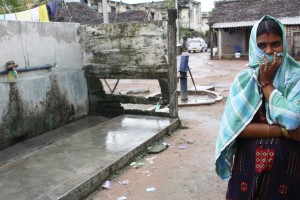Ensuring Women’s Safety and Dignity Where Bathrooms Are Scarce
“During the floods, we saw funerals for women who’d died of snakebites,” says Jaya Menon, a Catholic Relief Services staffer working in India during severe floods of autumn 2010. “The women had to wait till evening to go to the bathroom outside, and in the dark, they couldn’t see the snakes.”
CRS projects that build toilets or bathing spaces aren’t very glamorous, but they save lives. They also make women’s lives easier in places where using the great outdoors as a bathroom is dangerous. In some places, catastrophes like floods destroy existing outhouses and people must answer nature’s call wherever they have escaped to. Floods also bring out snakes; the combination of darkness and poisonous reptiles can be deadly.
In other places, like refugee camps, women are teased or even sexually abused when walking to brush areas used as bathrooms. Male relatives may have to accompany them to protect them. If women have no privacy, men with cell phones may snap photos of them. And even when harassment is not a threat, women in conservative societies have to “hold it” from daylight to dusk when no bathrooms are available, because relieving themselves outside in daytime isn’t culturally acceptable. When traveling on long journeys, women in poor countries often “consume minimal or no water because there are no hygienic or secure bathrooms,” says Menon.
Throughout Asia, Catholic Relief Services tailors its sanitation projects to ensure women’s safety and dignity. In southern India, CRS and its local diocesan partners build toilet facilities and bathing areas in refugee camps for people who fled Sri Lanka’s civil war.
The new spaces ensure that teen girls, in particular, have a place to go where they will not be harassed. When thousands fled conflict in northern Pakistan, CRS built latrines and used additional privacy screens in areas where women are traditionally not allowed to be seen walking, in this case from the house to the bathroom.
In rural Pakistan, where some village schools don’t have proper bathrooms for girls, CRS has built dozens of elementary schools with culturally-accepted toilet facilities. Now, girls who might have chosen not to come to school out of embarrassment, or would not be allowed to come to school because of latrine issues, can get an education.
In its cash-for-work programs in Bangladesh, CRS employs women to help rebuild cyclone-destroyed roads. It also provides special outhouses for women on the road crews, women who might otherwise not be allowed to work if their families fear they will be harassed when relieving themselves. In its cash-for-work programs in Bangladesh, CRS employs women to help rebuild cyclone-destroyed roads. It also provides special outhouses for women on the road crews, women who might otherwise not be allowed to work if their families fear they will be harassed when relieving themselves.
Women whose lives have been derailed by cyclones, floods, and war have enough things to worry about. Going to the bathroom should not be one of them. CRS makes sure it isn’t.


